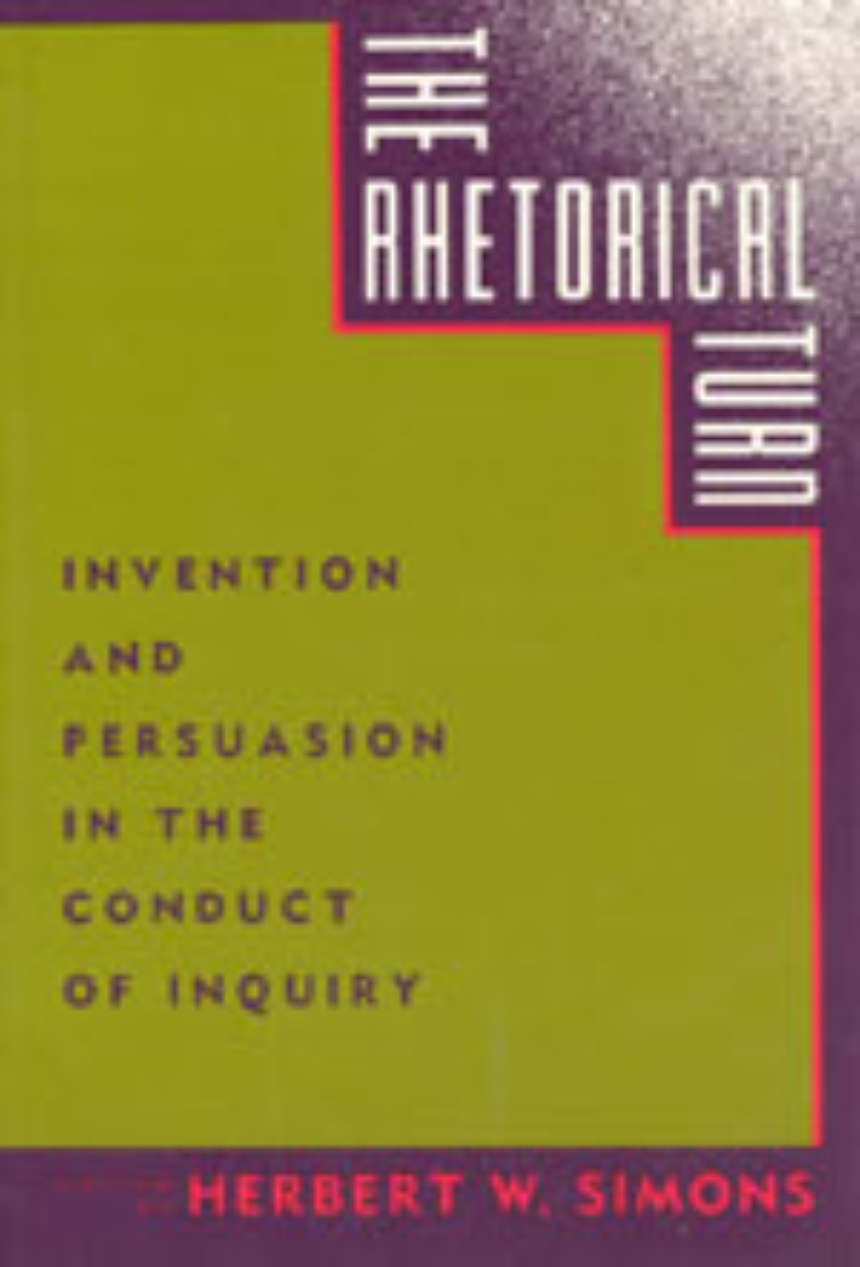The Rhetorical Turn
Invention and Persuasion in the Conduct of Inquiry
9780226759029
9780226759012
9780226759036
The Rhetorical Turn
Invention and Persuasion in the Conduct of Inquiry
We have only recently started to challenge the notion that "serious" inquiry can be free of rhetoric, that it can rely exclusively on "hard" fact and "cold" logic in support of its claims. Increasingly, scholars are shifting their attention from methods of proof to the heuristic methods of debate and discussion—the art of rhetoric—to examine how scholarly discourse is shaped by tropes and figures, by the naming and framing of issues, and by the need to adapt arguments to ends, audiences, and circumstances. Herbert W. Simons and the contributors to this important collection of essays provide impressive evidence that the new movement referred to as the rhetorical turn offers a rigorous way to look within and across the disciplines.
The Rhetorical Turn moves from biology to politics via excursions into the rhetorics of psychoanalysis, decision science, and conversational analysis. Topics explored include how rhetorical invention guides scientific invention, how rhetoric assists political judgment, and how it integrates varying approaches to meta-theory. Concluding with four philosophical essays, this volume of case studies demonstrates how the inventive and persuasive dimensions of scholarly discourse point the way to forms of argument appropriate to our postmodern age.
The Rhetorical Turn moves from biology to politics via excursions into the rhetorics of psychoanalysis, decision science, and conversational analysis. Topics explored include how rhetorical invention guides scientific invention, how rhetoric assists political judgment, and how it integrates varying approaches to meta-theory. Concluding with four philosophical essays, this volume of case studies demonstrates how the inventive and persuasive dimensions of scholarly discourse point the way to forms of argument appropriate to our postmodern age.
Table of Contents
Introduction: The Rhetoric of Inquiry as an Intellectual Movement, Herbert W. Simons
Part One: Rhetorics of Science
1 Bio-Rhetorics: Moralizing the Life Sciences, John Lyne
2 Scientific Discovery and Rhetorical Invention: The Path to Darwin’s, Origin, John Angus Campbell
3 The Origin of Species: Evolutionary Taxonomy as an Example of the Rhetoric of Science, Alan G. Gross
4 Psychoanalysis: Science or Rhetoric?, Tullio Maranhao
5 Discursive Constraints on the Acceptance and Rejection of Knowledge Claims: The Conversation about Conversion, Robert E. Sanders
6 The Rhetoric of Decision Science, or Herbert A. Simon Says, Carolyn R. Miller
Part Two: The Politics of Rhetoric and the Rhetoric of Politics
7 Arguing over Incommensurable Values: The Case of Machiavelli, Eugene Garver
8 Narrative Figures and Subtle Persuasions: The Rhetoric of the MOVE Report, Susan Wells
9 The Rhetoric of the Commons: Forum Discourse in Politics and Society, Manfred Stanley
10 Political Foundations for the Rhetoric of Inquiry, John S. Nelson
Part Three: Philosophical Probes and Reflections
11 The Checkmate of Rhetoric (But Can Our Reasons Become Causes?), Kenneth J. Gergen
12 Reconciling Realism and Relativism, Joseph Margolis
13 Symbolic Realism and the Dualism of the Human Sciences: A Rhetorical Reformulation of the Debate between Positivism and Romanticism, Richard Harvey Brown
14 Rhetoric and Its Double: Reflections on the Rhetorical Turn in the Human Sciences, Dilip Parameshwar Gaonkar
Part One: Rhetorics of Science
1 Bio-Rhetorics: Moralizing the Life Sciences, John Lyne
2 Scientific Discovery and Rhetorical Invention: The Path to Darwin’s, Origin, John Angus Campbell
3 The Origin of Species: Evolutionary Taxonomy as an Example of the Rhetoric of Science, Alan G. Gross
4 Psychoanalysis: Science or Rhetoric?, Tullio Maranhao
5 Discursive Constraints on the Acceptance and Rejection of Knowledge Claims: The Conversation about Conversion, Robert E. Sanders
6 The Rhetoric of Decision Science, or Herbert A. Simon Says, Carolyn R. Miller
Part Two: The Politics of Rhetoric and the Rhetoric of Politics
7 Arguing over Incommensurable Values: The Case of Machiavelli, Eugene Garver
8 Narrative Figures and Subtle Persuasions: The Rhetoric of the MOVE Report, Susan Wells
9 The Rhetoric of the Commons: Forum Discourse in Politics and Society, Manfred Stanley
10 Political Foundations for the Rhetoric of Inquiry, John S. Nelson
Part Three: Philosophical Probes and Reflections
11 The Checkmate of Rhetoric (But Can Our Reasons Become Causes?), Kenneth J. Gergen
12 Reconciling Realism and Relativism, Joseph Margolis
13 Symbolic Realism and the Dualism of the Human Sciences: A Rhetorical Reformulation of the Debate between Positivism and Romanticism, Richard Harvey Brown
14 Rhetoric and Its Double: Reflections on the Rhetorical Turn in the Human Sciences, Dilip Parameshwar Gaonkar
